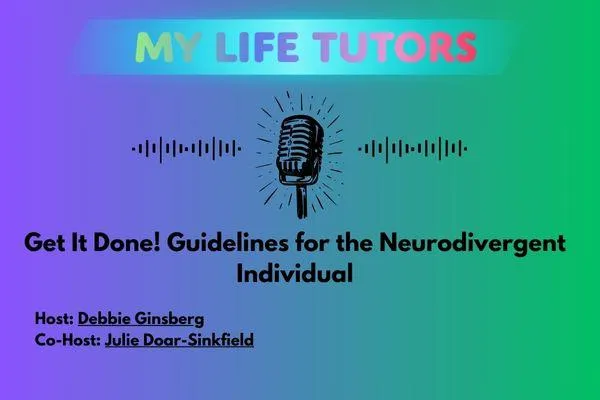
Episode 23: Get It Done! Guidelines for the Neurodivergent Individual
Introduction
Welcome to our podcast, Get It Done. This is your guideline for neurodivergent individuals, particularly those with high functioning ADHD and autism. I'm Debbie Ginsburg, owner of Organize You for Life, where I assist high school and post-high school students through various life transitions. My co-host is Julia Doris-Sinkfield, co-owner and CEO of MyLifeTutors, where we work with neurodivergent high school and college students on college success and mentoring. Today, we'll discuss the impacts of COVID-19 on college students, particularly neurodivergent individuals, and the lasting effects we're seeing five years later.
Key Takeaways
Initial Impact of COVID-19:
The sudden transition to remote learning was challenging, especially for neurodivergent individuals who rely heavily on structured routines.
Students in larger public schools struggled more with the lack of infrastructure to support effective online learning compared to those in smaller private schools with hybrid schedules.
Social and Emotional Challenges:
The lack of social interaction and the unpredictability of changing school policies added significant stress.
Neurodivergent students, in particular, faced amplified challenges in adapting to new routines and environments.
Academic Adjustments:
Online learning, especially asynchronous formats, posed difficulties due to the lack of immediate support and the need for self-management.
Many students, both neurodivergent and neurotypical, experienced a decline in academic performance and engagement.
Current Issues and Adaptations:
Today, students struggle with social skills and anxiety, a result of prolonged isolation during the pandemic.
There's an increased need for personalized support, including mentoring, life coaching, and tailored academic advising to help students navigate post-pandemic challenges.
Employment Challenges:
The job market has become more competitive, particularly in fields like technology, where there was previously a high demand for graduates.
Neurodivergent individuals may find it particularly challenging to compete due to both academic and social skill gaps.
Importance of Support Systems:
Building relationships with disability offices, academic advisors, and mentors is crucial for student success.
Customized programs that address both emotional regulation and academic needs can significantly aid neurodivergent students.
Conclusion
The impacts of COVID-19 on neurodivergent college students have been profound and multifaceted, affecting social skills, academic performance, and career prospects. However, with proper support systems, personalized mentoring, and a focus on both emotional and academic growth, these students can navigate the post-pandemic landscape successfully. It's essential for educators, parents, and students to work together to create environments that foster stability and success, despite the ongoing challenges.
